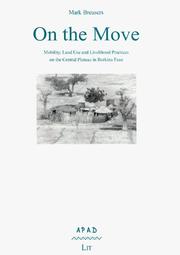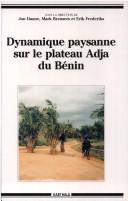| Listing 1 - 10 of 70 | << page >> |
Sort by
|

ISBN: 3825839419 9783825839413 Year: 1999 Volume: 3 Publisher: Münster LIT
Abstract | Keywords | Export | Availability | Bookmark
 Loading...
Loading...Choose an application
- Reference Manager
- EndNote
- RefWorks (Direct export to RefWorks)
Dissertation
ISBN: 9054858362 Year: 1998 Publisher: Wageningen : Landbouwuniversiteit Wageningen,
Abstract | Keywords | Export | Availability | Bookmark
 Loading...
Loading...Choose an application
- Reference Manager
- EndNote
- RefWorks (Direct export to RefWorks)
Utilisation des terres --- land use --- Système d'exploitation agricole --- farming systems --- History --- Population rurale --- Rural population --- Environnement socioculturel --- sociocultural environment --- Ressource en sol --- Soil resources --- Mobilité de la main d'oeuvre --- Labour mobility --- Migration --- Burkina Faso --- Côte d'Ivoire --- Cote d'Ivoire --- 332 --- 314.7 --- <662.5> --- 631.474 --- Regionale economie. Territoriale economie. Grond en bodem. Onroerend goed. Economie van het wonen --- Migratie. Geografische mobiliteit. Verhuizingen--(demografie) --- Land classification and utilization --- Theses --- 314.7 Migratie. Geografische mobiliteit. Verhuizingen--(demografie) --- 332 Regionale economie. Territoriale economie. Grond en bodem. Onroerend goed. Economie van het wonen --- Cote d'Ivoire. --- Ethnologie --- Moogo
Book
Year: 1985 Publisher: Brussel VUB
Abstract | Keywords | Export | Availability | Bookmark
 Loading...
Loading...Choose an application
- Reference Manager
- EndNote
- RefWorks (Direct export to RefWorks)
Book
Year: 1998 Publisher: Wageningen : Grafisch Service Centrum van Gils B.V.,
Abstract | Keywords | Export | Availability | Bookmark
 Loading...
Loading...Choose an application
- Reference Manager
- EndNote
- RefWorks (Direct export to RefWorks)
Land use, Rural --- Migration, Internal --- Utilisation agricole du sol --- Migration intérieure
Book
ISBN: 906832392X Year: 2002 Volume: *79 Publisher: Amsterdam Koninklijk Instituut voor de Tropen (KIT)
Abstract | Keywords | Export | Availability | Bookmark
 Loading...
Loading...Choose an application
- Reference Manager
- EndNote
- RefWorks (Direct export to RefWorks)
Geschiedenis en politiek - samenleving - economie - cultuur - natuur en milieu
Burkina Faso --- reisgidsen (genre) --- Regional documentation --- reisgidsen --- Burkina Faso 994 --- 916.67 --- land- en volkenkunde --- 282 Landbeschrijvingen (sociaal-economisch-cultureel) --- Burkina Faso, Ghana --- Burkina Faso. --- Burkina --- Bourkina --- Bourkina Fasso --- République démocratique du Burkina Faso --- Burukina Faso --- ブルキナファソ --- Burukinafaso --- בורקינה פסו --- Burḳinah Faso --- Upper Volta --- Gouvernement du Burkina Faso --- Sociale aardrijkskunde --- Economische aardrijkskunde --- Politiek --- Geschiedenis --- Toerisme --- Afrika --- Geneeskunde --- Techniek (wetenschap) --- Atlas --- Museum --- Maatschappij --- Film --- 982 --- geografie Afrika --- géographie Afrique

ISBN: 2865377989 Year: 1997 Publisher: Paris Karthala
Abstract | Keywords | Export | Availability | Bookmark
 Loading...
Loading...Choose an application
- Reference Manager
- EndNote
- RefWorks (Direct export to RefWorks)
Peasants --- Agriculture --- Paysannerie --- Social Sciences and Humanities. Development Studies --- Rural Development --- Rural Development. --- Peasantry --- Agricultural laborers --- Rural population --- Marks (Medieval land tenure) --- Villeinage --- Farming --- Husbandry --- Industrial arts --- Life sciences --- Food supply --- Land use, Rural
Dissertation

Year: 2017 Publisher: Leuven KU Leuven. Faculteit Sociale Wetenschappen
Abstract | Keywords | Export | Availability | Bookmark
 Loading...
Loading...Choose an application
- Reference Manager
- EndNote
- RefWorks (Direct export to RefWorks)
This thesis explores the ways in which people in Banjul, The Gambia, deal with and make sense of migration and mobility in everyday life. Banjul is the capital of The Gambia and hosts many families that are dealing with migration to Europe. Many youngsters from the city left in search for a better future, mainly in Europe. This thesis describes the context and the way in which many aspects of social life are affected by this phenomenon. The purpose of this thesis is to understand how people at home deal with migration and mobility of their son, their brother or their friend while taking into consideration socio-economic, historical and political aspects. In relation with their own situation, they form an imagination about Europe. This imagination influences the daily life in Banjul. Drawing on two months of fieldwork, this thesis portrays different everyday realities in which people in Banjul deal with and make sense of migration.
Dissertation
Year: 2015 Publisher: Leuven : KU Leuven. Faculteit Sociale Wetenschappen
Abstract | Keywords | Export | Availability | Bookmark
 Loading...
Loading...Choose an application
- Reference Manager
- EndNote
- RefWorks (Direct export to RefWorks)
The Mara region of Myanmar is experiencing a period of potentially dramatic change. Food insecurity combined with a changing political environment and improved formal education opportunities are driving residents of this region to consider re-casting their lives and livelihoods: from long-employed forms of subsistence agriculture to mixed livelihoods and new modes of food production. This thesis considers how the lessons learned from anthropological critique of development can be applied to this context of significant transition in the Mara region. An anthropological approach will be used to better understand the local specificities of the Mara situation. The respective roles and potential of local and external actors in development will be examined, considering how anthropology can help those who pursue the notion of development in this region to avoid some of the common pitfalls of this endeavor. The thesis raises some key anthropological critiques of development and opens the discussion of how these criticisms might be heeded in the Mara context. The thesis argues that the Mara, together with other development actors in this region should guard against the ways development tends to promote singular, linear paths to progress while sidelining alternative trajectories. Development actors in the Mara region are also cautioned against privileging certain forms of knowledge and being sensitive to the power dynamics involved in the process of development practice.
Dissertation
Year: 2018 Publisher: Leuven KU Leuven. Faculteit Sociale wetenschappen
Abstract | Keywords | Export | Availability | Bookmark
 Loading...
Loading...Choose an application
- Reference Manager
- EndNote
- RefWorks (Direct export to RefWorks)
Dissertation
Year: 2015 Publisher: Leuven : KU Leuven. Faculteit Sociale Wetenschappen
Abstract | Keywords | Export | Availability | Bookmark
 Loading...
Loading...Choose an application
- Reference Manager
- EndNote
- RefWorks (Direct export to RefWorks)
Samenvatting: Kerntechnologie en - energie in de risicosamenleving. Anayse van de groene culturele repertoires. Kernenergie. Voor of tegen? Aanvaardbaar of onaanvaardbaar? Het zijn vragen die de politiek, de pers, maatschappelijke groepen en bezorgde burgers al decennialang in de ban houdenMet de opmaak van het Energiepact in het verschiet, worden het debat weer op scherp gesteld. Kan kernenergie deel uitmaken van onze toekomstige 'energyscape'? Kerntechnologie en - energie werd geïntroduceerd in België in de periode na WOII. De nucleaire sector promootte de technologie als de weg naar economische groei en materiële welvaart. Aanvankelijk was er weinig verzet maar dit veranderde snel. Mensen werden geconfronteerd met nefaste effecten van de economische groei: ernstige milieurampen, nucleaire incidenten, onrechtvaardige Noord -Zuid verhoudingen. De beweging Agelev was gestoeld op deze verontwaardiging die hieruit voortvloeide. Tijdens de woelige jaren '70 werd kernenergie gepercipieerd als een manier om energieonafhankelijk te zijn. De eerste kernreactoren werden gebouwd ondanks het verzet van de groenen. Halverwege de jaren '90 is er internationaal aandacht voor de staat van het milieu en is men bezorgd over de mogelijke gevolgen van de klimaatopwarming. De nucleaire sector ziet in kernenergie de oplossing. Ze promoot het als een CO2 arme energiebron en een middel in de strijd tegen klimaatopwarming. De groenen staan echter kritisch tegenover het discours van de nucleaire sector. Zij zien industriële en nucleaire accidenten als het onvoorspelbare resultaat van politieke, economische en technologische beslissingen. Wetenschappelijke en technologische ontwikkelingen hadden geleid tot het ontstaan van een nieuw soort risico die enorme onzekerheden met zich meebrengt. Onzekerheid werd een nieuwe manier zo van zijn in deze huidige samenleving; de risicosamenleving. Het is een samenlevingsvorm die ontstond in het Antropoceen, een geologisch tijdperk waar de mens de schepper van de natuur is. De wetenschappelijke en technologische ontwikkelingen die dit nieuw tijdperk hebben ingeluid, zorgden er immers voor dat we balanceren op de draagkracht van de planeet. De groenen maken in hun verzet tegen kernenergie gebruik van verschillende culturele repertoires. Culturele repertoires verwijzen naar het collectief van actiestrategieën die men aanwendt om gebeurtenissen te interpreteren en toekomstige acties richting te geven. In het antigenocide - en ecocide repertoire van de groenen staat het destructieve potentieel van de technologie centraal. Dit komt aan bod in de kritiek op uraniummijnen, de mogelijkheid van een kernongeval en op het bestaan en gebruik van kernwapens. In het anti-imperialistische repertoire klagen de groenen de superioriteit van bepaalde landen en internationale bedrijven in de nucleaire sector aan. Deze kritiek is onder meer gericht op de mijnbouw waar uraniumproducerende landen door een zwakke economische en politieke situatie dreigen uitgebuit te worden. Ze staan echter ook kritisch tegenover het Non- Poliferatieverdrag dat de basis vormt voor het globale nucleaire regime. Het sacrale repertoire legt de nadruk op de kwetsbaarheid van de mens en het opgebouwde socio-economische systeem. Eén kernramp kan immers het einde betekenen. Er is echter hoop tot 'verlossing': via politieke acties kan men het beleid aanzetten tot een gefaseerde kernuitstap en mogelijke - geponeerd als waarschijnlijke - doemscenario's vermijden.
| Listing 1 - 10 of 70 | << page >> |
Sort by
|

 Search
Search Feedback
Feedback About UniCat
About UniCat  Help
Help News
News